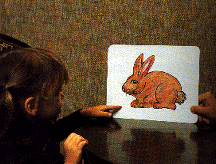[Wesleyan Home Page]
[Wesmaps Home Page]
[Availability Statistics Search]
[Course Description Search]
[Dept. Search]
PSYC331
Language Development
PSYC331 SP
 Photo Caption and Credits
Photo Caption and Credits
Next Offered in 9798 SP
This course will survey classic and contemporary theory and
research on the nature of language development in young
children. It will include discussion of the innate
biological specialization for language in human children,
as created from various theoretical perspectives. Topics
covered will focus on the acquisition of semantics, syntax,
morphological rules, and phonological organization beginning
with evidence regarding their precursory foundation in
infancy and continuing through the child's relative mastery
of native language by the early gradeschool years.
MAJOR READINGS
Berko-Gleason, J. (1993). THE DEVELOPMENT
OF LANGUAGE. Third Edition. MacMillan Publishing Co.
Required readings will also include original research
articles and book chapters, e.g., Gleitman, Gleitman, Landau
& Wanner (1987). Where language begins: Initial
representations for language learning. F. Newmeyer (ed) "The
Cambridge Linguistic Survey." Cambridge University Press.
Fromkin, V., (1974) The development of language in Genie:
A case of language acquisition beyond the critical period:
BRAIN & LANGUAGE
EXAMINATIONS AND ASSIGNMENTS
Midterm exam, final exam,
in-class discussion, 10-12 page term paper (literature
review of scientific research on a topic in language
acquisition)
ADDITIONAL REQUIREMENTS and/or COMMENTS
This is a seminar course in Developmental Psychology.
Unless preregistered students attend the first class meeting
or communicate directly with the instructor prior to the
first class, they will be dropped from the class list.
NOTE: Students must still submit a completed Drop/Add form
to the Registrar's Office.
COURSE FORMAT: Discussion Lecture
REGISTRATION INFORMATION
Level: UG Credit: 1.00
Gen Ed Area & Dept: NSM PSYC
Prerequisites:
PSYC105 or PSYC220 or PSYC230 or PSYC231
Last Updated on MAR-10-1997
About the Photo:
Recognition, an early form of learning
Reference:
Papalia, Diane E. and Sally Wendkos Olds, A CHILD'S
WORLD, New York: McGraw-Hill, 1986.
Contact wesmaps@wesleyan.edu to
submit comments or suggestions.
Copyright Wesleyan University, Middletown, Connecticut, 06459
 Photo Caption and Credits
Photo Caption and Credits